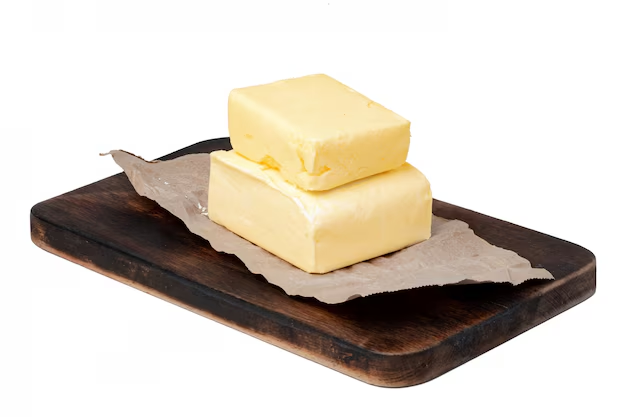Butter has been a staple in kitchens worldwide for centuries. Its creamy texture and rich flavor make it a favorite in baking, cooking, and spreading. But is butter bad for cholesterol? The question arises due to butter’s high saturated fat content, which has been linked to elevated cholesterol levels and potential heart health risks.
In this article, we’ll explore how butter impacts cholesterol and cardiovascular health. We’ll also dive into alternatives, including margarine and grass-fed butter, to help you make informed dietary choices.
Is Butter Bad For Cholesterol And Heart?
Butter’s relationship with heart health primarily revolves around its saturated fat content. Saturated fats can contribute to increased levels of low-density lipoprotein (LDL), often called “bad cholesterol.” High LDL cholesterol levels are linked to an increased risk of cardiovascular diseases (CVD), including heart attacks and strokes.
Saturated Fat and Cholesterol
Health organizations like the American Heart Association (AHA) caution against excessive consumption of saturated fats.
Studies reveal that diets high in saturated fats are associated with plaque buildup in arteries, leading to atherosclerosis—a key contributor to heart disease. Butter, being nearly 63% saturated fat, plays a significant role in this equation.
However, it’s not just about eliminating butter entirely. Portion size and dietary balance are equally important. Butter can be part of a healthy diet if consumed in moderation alongside heart-friendly foods like fruits, vegetables, and whole grains.
Saturated Fat in Butter
Butter contains about 7 grams of saturated fat per tablespoon. This accounts for more than a third of the recommended daily limit of saturated fat for a 2,000-calorie diet. According to the AHA, saturated fat intake should not exceed 5-6% of daily calories, or about 13 grams for most adults.
How Do Saturated Fats Affect LDL Cholesterol?
Saturated fats increase LDL cholesterol levels by stimulating the liver to produce more cholesterol. This added LDL cholesterol can deposit in blood vessel walls, forming plaques that narrow or block arteries. While not all saturated fats are equally harmful, those in butter are particularly potent in raising LDL levels.
For individuals at risk of heart disease, reducing saturated fat intake is crucial. Swapping butter for healthier fats like those in olive oil, avocado, or nuts can help lower LDL cholesterol while providing essential nutrients.
To Read: Is Peanut Butter Low in Carbs? A Comprehensive Guide
Impact of Butter on LDL Levels
Research consistently shows that butter consumption raises LDL cholesterol levels. However, the extent of the increase depends on portion size and overall dietary patterns.
For instance, consuming small amounts of butter in a diet rich in fiber, lean protein, and healthy fats may have a minimal impact on cholesterol.
Portion Size Matters
One tablespoon of butter may not seem significant, but habitual overuse can quickly lead to excessive saturated fat intake. Instead of spreading butter generously on toast or using it liberally in recipes, consider measuring portions and combining butter with other flavorful ingredients like herbs or spices.
Dietary Context
The impact of butter on LDL levels also depends on what it replaces in your diet. If butter replaces trans-fat-laden margarine or processed oils, its effect might be less harmful.
However, substituting butter for heart-healthy oils like olive or canola oil is a better choice for reducing LDL cholesterol and improving heart health.
Is Margarine Better Than Butter for Cholesterol?

The butter-versus-margarine debate has been ongoing for decades. Margarine was initially introduced as a heart-healthy alternative, but early versions contained trans fats—now known to be more harmful than saturated fats.
Trans Fats and Cholesterol
Trans fats, commonly found in partially hydrogenated oils, raise LDL cholesterol while lowering high-density lipoprotein (HDL), the “good” cholesterol. This dual effect significantly increases the risk of heart disease. Thankfully, trans-fat-free margarines are now widely available in the U.S.
Saturated Fats in Margarine
Modern margarine products often contain less saturated fat than butter, making them a better choice for cholesterol management. However, it’s important to read labels carefully, as some margarines still contain high levels of saturated fats or palm oil, which can also impact cholesterol levels negatively.
Grass-fed butter and Cholesterol
Grass-fed butter is often marketed as a healthier option due to its higher levels of omega-3 fatty acids and conjugated linoleic acid (CLA). Omega-3s are known for their anti-inflammatory properties and potential heart health benefits.
Nutritional Profile
Grass-fed butter contains more beneficial nutrients than conventional butter. It has a better omega-3 to omega-6 ratio and is richer in fat-soluble vitamins like A, D, and K2.
Is Grass-Fed Butter Heart-Healthy?
Despite its improved nutrient profile, grass-fed butter still contains significant amounts of saturated fat. While the omega-3s and CLA may offset some of the negative effects, grass-fed butter can still raise LDL cholesterol if consumed in large quantities.
Expert Opinions
Nutrition experts recommend treating grass-fed butter as a healthier alternative but not a heart-health miracle. Moderation remains key, and pairing grass-fed butter with a balanced diet rich in vegetables, whole grains, and lean proteins can help manage cholesterol levels effectively.
Healthy Fats vs. Saturated Fats
When it comes to dietary fats, not all are created equal. Saturated fats, like those found in butter, are known to increase LDL cholesterol, which can raise the risk of heart disease. In contrast, unsaturated fats—found in foods like olive oil, nuts, seeds, and fatty fish—are considered heart-healthy and can improve cholesterol profiles.
- Saturated Fats: Found in animal products like butter, cheese, and red meat. They raise LDL cholesterol, which can contribute to artery-clogging plaques.
- Unsaturated Fats: Include monounsaturated and polyunsaturated fats. These are found in foods like avocados, nuts, seeds, and fish. They help lower LDL cholesterol and may increase HDL (“good”) cholesterol.
Why Choose Healthy Fats?
Replacing saturated fats with unsaturated fats can significantly reduce the risk of heart disease. For example, using olive oil instead of butter for cooking provides similar richness while promoting better heart health. Adding nuts or seeds to your meals is another simple way to boost healthy fat intake.
To Read: Is Peanut Butter Good for You?: 5 Potential Health Benefits
Butter Alternatives for Cholesterol
If you’re looking to lower cholesterol, there are several butter alternatives that are both nutritious and delicious. These options allow you to maintain flavor in your meals without the risks associated with saturated fats.
Heart-Healthy Alternatives
- Olive Oil: A versatile option for cooking and drizzling, olive oil is rich in monounsaturated fats that help reduce LDL cholesterol.
- Avocado Oil: Great for high-heat cooking, it’s loaded with healthy fats and a mild flavor.
- Plant-Based Spreads: Products made from vegetable oils, often fortified with heart-friendly plant sterols, are excellent for replacing butter.
Pros and Cons of Plant-Based Butter Substitutes
- Pros: Lower in saturated fats, often fortified with cholesterol-lowering ingredients, and better for heart health.
- Cons: Some contain additives or palm oil, which may not be as beneficial. Always check labels for trans fats or unnecessary ingredients.
Switching to these alternatives doesn’t mean you have to sacrifice taste or texture. Experiment with these options to find the best fit for your dietary needs.
Cholesterol Levels and Dietary Fats

Your cholesterol levels are influenced by both the type and quantity of fats you consume. While some fats are essential for the body, others can lead to health complications when consumed in excess.
Understanding the Relationship
- Excessive saturated fats from foods like butter can increase LDL cholesterol.
- Unsaturated fats, on the other hand, can help reduce LDL levels and maintain healthy cholesterol balance.
The Importance of Moderation
Moderation is key. Instead of avoiding fats entirely, focus on incorporating a variety of healthy fats while limiting saturated fats. Balance is crucial—pair fat sources with nutrient-dense foods like vegetables, legumes, and whole grains for optimal health.
Butter Consumption Moderation
You don’t have to eliminate butter entirely from your diet to maintain healthy cholesterol levels. Instead, aim for mindful consumption and small adjustments to your eating habits.
Practical Tips for Limiting Butter
- Measure Portions: Stick to 1 teaspoon or less per serving.
- Pair with Healthier Foods: Combine butter with whole grains or steamed vegetables to add flavor without overindulging.
- Use as a Flavor Enhancer: Rather than relying on butter for cooking, use it sparingly to finish a dish, adding richness without overloading on saturated fat.
- Try Cooking Alternatives: Experiment with olive oil, avocado oil, or low-fat yogurt in recipes to cut back on butter usage.
By making these small changes, you can still enjoy the taste of butter while prioritizing heart health.
To Read: 100+ Best Foods That Burn Belly Fat Fast
FAQs
Is butter or oil worse for cholesterol?
Butter contains more saturated fats than most oils, which can raise LDL cholesterol. However, oils like coconut oil are also high in saturated fats. Opt for heart-healthy oils like olive oil for better cholesterol management.
Can I eat butter if I have high cholesterol?
If you have high cholesterol, butter should be consumed sparingly. Choose healthier fat sources like olive oil or avocado and monitor your overall saturated fat intake to support heart health.
Is it okay to eat butter every day?
Daily butter consumption is fine in small amounts for individuals with normal cholesterol levels. However, for those with high cholesterol or heart concerns, it’s best to limit butter and focus on healthier fat sources.
Is butter healthy or junk?
Butter isn’t inherently junk but is calorie-dense and high in saturated fats. When used in moderation and balanced with healthy fats, it can be part of a healthy diet.
Conclusion
So, is butter bad for cholesterol? The answer lies in how it’s consumed. While butter is high in saturated fat and can raise LDL cholesterol, its impact depends on portion sizes and overall dietary balance. Moderation is crucial. By limiting butter intake and replacing it with heart-healthy alternatives like olive oil or avocado oil, you can maintain flavor in your meals without compromising your cholesterol levels.

